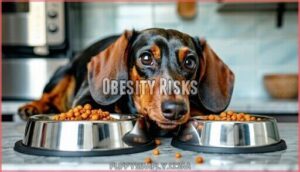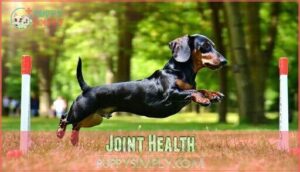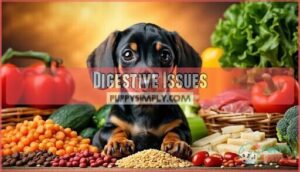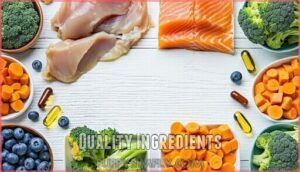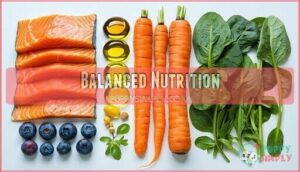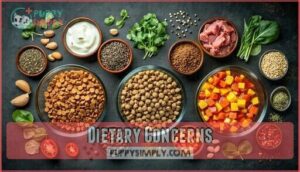This site is supported by our readers. We may earn a commission, at no cost to you, if you purchase through links.

The best dog food for dachshunds contains high-quality protein, controlled calories, and smaller kibble sizes perfect for their mouths.
Look for foods with glucosamine for joint support and avoid fillers that pack on pounds. Small-breed formulas work well since they’re calorie-dense and nutrient-rich.
Your wiener dog’s unique body shape means standard dog food won’t cut it—they need recipes designed for their specific challenges. Smart feeding choices today can save you from costly vet bills tomorrow and keep your dachshund’s tail wagging for years to come.
Table Of Contents
- Key Takeaways
- Dachshund Nutritional Needs
- Common Health Issues
- Choosing Best Dog Food
- Top 10 Best Dog Foods
- 1. Blue Buffalo Small Breed Adult Dog Food
- 2. Dr Tims Kinesis Dog Food
- 3. Small Breed Complete Health
- 4. Merrick Lil Plates Wet Dog Food
- 5. Organix Organic Small Breed Recipe
- 6. Whole Earth Farms Grain-Free Chicken Turkey Dog Food
- 7. Nutro Natural Choice Senior Chicken Rice
- 8. Natures Logic Canine Beef
- 9. ORIJEN Puppy Dog Food
- 10. Diamond Naturals Puppy Dog Food
- Feeding Tips and Considerations
- Frequently Asked Questions (FAQs)
- Should Dachshunds have dry or wet food?
- Is Purina Pro Plan good for Dachshunds?
- What are Dachshunds most allergic to?
- What diet should a Dachshund have?
- Can dachshunds eat homemade dog food safely?
- What treats are best for dachshunds?
- Are grain-free diets necessary for dachshunds?
- How to transition between different food brands?
- Do dachshunds need special feeding bowls?
- Conclusion
Key Takeaways
- Choose protein-rich, low-fat formulas – Look for 28-43% protein with controlled fat content under 10% to support your dachshund’s spine while preventing pancreatitis and weight gain
- Feed smaller, frequent meals – Give puppies 4 meals daily and adults 2-3 meals using proper portion control (575 calories for adults, 900 for active dogs) to prevent dangerous weight gain on their backs
- Select small-breed kibble with joint support – Pick foods with smaller kibble sizes for their mouths plus glucosamine and chondroitin to protect their vulnerable spine and joints
- Avoid common allergens and fillers – Skip corn, wheat, soy, and fatty table scraps that can trigger digestive issues or pancreatitis in this sensitive breed
Dachshund Nutritional Needs
Your dachshund’s unique body shape creates specific nutritional demands that change throughout their life.
Understanding these requirements helps prevent common health issues while supporting their long spine and maintaining an ideal weight.
This understanding is crucial for preventing common health issues.
Life Stage Nutrition
Your dachshund’s nutritional journey shifts dramatically through life stages. Understanding these stages guarantees maximal health and prevents common breed-specific problems.
Key Life Stage Requirements:
- Puppy Growth (0-12 months): Higher protein sources and calories for rapid development
- Adult Maintenance (1-7 years): Balanced dachshund food with moderate calorie needs
- Senior Diets (8+ years): Increased protein, joint support supplements
Life stages demand different dog food for dachshunds puppies versus adult formulas. Dachshunds also require different nutritional needs by life stage to maintain they remain healthy.
Essential Amino Acids
Your dachshund’s body needs specific amino acids to build strong muscles and repair tissues daily.
Isoleucine stands out as particularly important – puppies require 0.71% while adults need 0.38% for proper protein synthesis.
Quality dachshund food contains chicken, turkey, fish, and beef as isoleucine sources.
Without adequate essential amino acids, your dog may show muscle weakness, poor coat quality, and slower healing.
Choose foods listing whole animal proteins first to support healthy muscle development throughout your dachshund’s life.
Calcium Requirements
Why does your dachshund need specific calcium amounts? Puppy calcium requirements are higher for bone development, while adult calcium needs stabilize around 50mg per kilogram daily.
Senior calcium intake should increase slightly for aging bones. Quality dachshund food provides adequate calcium sources without supplement risks.
Calcium aids digestion and other bodily functions. The calcium to phosphorus ratio must stay balanced between 1:1 and 2:1 for ideal dachshund nutrition and health.
Water Intake
Water makes up 65% of your dachshund’s body weight, making hydration absolutely essential for their health.
**Proper hydration keeps your wiener dog’s spine healthy and joints moving smoothly.
You’ll need to provide constant access to fresh water, regardless of whether you feed wet or dry food.
Active dachshunds require more water than couch potatoes, and you should watch for dehydration signs like dry gums or lethargy, which can quickly become serious in small breeds.
Consider a dachshund specific bowl to help them drink comfortably.
Common Health Issues
Dachshunds face unique health challenges that directly impact their dietary needs.
Their long backs make them prone to obesity, joint problems, digestive issues, and pancreatitis, which means you’ll need to choose food that supports their specific vulnerabilities.
Obesity Risks
Your dachshund’s adorable sausage shape makes them prone to packing on pounds faster than other breeds.
Grazing Dangers increase obesity risks since these food-motivated pups will eat continuously if allowed.
Strict Calorie Control becomes essential – active Dachshunds need 900 calories daily while adults require just 575.
Weight Monitoring helps maintain ideal body condition, and Treat Moderation prevents excess calorie intake.
Without proper weight management, your wiener dog faces serious health complications.
Joint Health
Beyond weight concerns, your dachshund’s elongated spine makes joint health paramount.
Their unique body structure puts extra stress on hips, knees, and vertebrae.
Look for foods containing glucosamine and chondroitin—these compounds help maintain cartilage and reduce inflammation.
Omega fatty acids also support joint function while managing weight.
Breed-specific formulas often include targeted joint support ingredients that regular dog foods lack.
Digestive Issues
Since many dachshunds struggle with food sensitivities and digestive sensitivities, you’ll need to watch for signs like loose stools or stomach upset.
Their sensitive stomach often stems from enzyme deficiencies that disrupt the gut microbiome.
Choose foods with probiotic benefits and appropriate fiber intake to support digestive health.
A carefully planned dachshund diet can prevent food allergies from developing into chronic issues.
Addressing these issues early can prevent serious gastrointestinal concerns.
Pancreatitis
Fatty foods act like a match to gasoline for your dachshund’s pancreas.
Your dachshund’s pancreas can’t handle rich, fatty foods—they’re pure trouble for this sensitive breed.
This breed predisposition makes dietary fat management essential for preventing painful inflammation that threatens digestive health.
Key prevention strategies include:
- Low-fat content diets (under 10% fat) for sensitive stomachs
- Grain content moderation to reduce digestive stress
- Enzyme support supplements for improved nutrient absorption
- Early detection through regular vet checkups and symptom monitoring
- Dachshund diet consistency avoiding table scraps and fatty treats
Choosing Best Dog Food
Selecting the right dog food for your dachshund requires understanding their unique nutritional needs and health vulnerabilities.
You’ll want to focus on high-quality animal proteins, balanced fat content, and ingredients that support their spine and joint health.
While avoiding foods that contribute to weight gain or digestive issues is crucial, it’s also important to recognize the importance of balanced fat content in their diet.
Quality Ingredients
When selecting dog food for your dachshund, you’ll want high-quality ingredients that mirror whole foods found in nature.
Look for animal-based proteins like chicken, turkey, or fish as the first ingredient—these whole meats provide complete amino acid profiles.
Human-grade ingredients guarantee safety and digestibility.
Check fat composition for omega fatty acids, examine carb quality from vegetables rather than fillers, and verify adequate vitamin content plus proper mineral balance to ensure a complete amino acid profile.
Balanced Nutrition
Properly balanced nutrition creates the foundation for your dachshund’s longterm health through carefully calibrated macronutrient ratios and micronutrient importance.
Quality ingredients meeting AAFCO standards guarantee digestibility factors support your dog’s unique nutritional needs.
- Protein powerhouse: 28-43% protein builds strong muscles for spine support
- Fat finesse: Balanced omega fatty acids keep joints flexible and coats shiny
- Carb control: Limited processed carbs prevent pancreatitis flare-ups
- Vitamin victory: Essential micronutrients boost immune system naturally
Life Stage Considerations
Your dachshund’s nutritional needs change dramatically throughout their life.
Puppy nutrition requires calorie-dense food with higher protein and fat for rapid growth. Adult diet focuses on balanced maintenance with controlled portions.
Senior needs include increased protein to preserve muscle mass and fewer calories to prevent weight gain. Choose puppy food, adult, or senior food formulas that match your dog’s current life stage for peak health.
Many brands also meet AAFCO nutritional standards for balanced diets.
Dietary Concerns
How can you address your dachshund’s unique dietary needs?
Managing food allergies, spinal issues, and sensitive stomach requires careful consideration:
- Grain inclusion vs. grain-free: Choose based on your dog’s tolerance and allergies
- Raw feeding and homemade diets: Consult your vet before switching from commercial foods
- Picky eaters: Gradual shifts help maintain digestive health and prevent finicky habits
Address these concerns to support ideal dachshund health.
Top 10 Best Dog Foods
You’ve found the top 10 dog foods that’ll keep your dachshund healthy and happy in 2025.
These carefully selected options address your wiener dog’s unique nutritional needs, from supporting their vulnerable spine to maintaining an ideal weight.
1. Blue Buffalo Small Breed Adult Dog Food
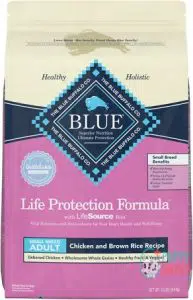
Blue Buffalo delivers real chicken as the first ingredient in this small breed formula, perfectly sized for your dachshund’s mouth.
The LifeSource Bits provide antioxidant-rich nutrition while supporting immune health.
This adult dog food offers excellent breed suitability with balanced protein levels.
| Ingredient Analysis | Palatability Factors | Cost Comparison |
|---|---|---|
| Real deboned chicken | High acceptance rate | Mid-range pricing |
| Brown rice & oatmeal | Natural flavors added | $2.50 per pound |
| LifeSource Bits formula | Small kibble size | Premium value option |
2. Dr Tims Kinesis Dog Food
Dr. Tim’s Kinesis stands out among best dachshund food options through rigorous ingredient analysis and superior omega ratio formulation.
This small breed food delivers exceptional palatability tests results, making it perfect for picky Dachshunds across all life stages.
- Contains 29% protein from premium chicken meal as primary protein source
- Features ideal 3.25:1 omega-6 to omega-3 fatty acid ratio
- Includes menhaden fish oil for EPA and DHA support
- Grain-inclusive formula promotes digestive health
- AAFCO-certified nutrition for all life stages
3. Small Breed Complete Health
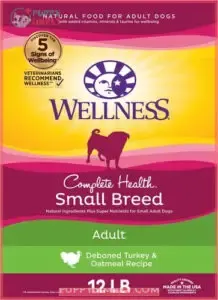
Wellness Complete Health delivers customized nutrition that’ll make your dachshund’s tail wag.
This best dachshund food features ideal kibble size for small breed dogs, plus probiotics added for digestive support.
| Feature | Benefit |
|---|---|
| Recipe Variety | Multiple protein options for picky eaters |
| Probiotics Added | Supports sensitive stomachs naturally |
| Small Kibble Size | Perfect for dachshund mouths |
| Omega Fatty Acids | Promotes healthy coat health |
| Small Breed Formula | Concentrated nutrition for tiny appetites |
4. Merrick Lil Plates Wet Dog Food
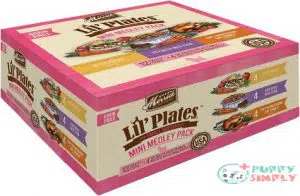
When your Dachshund needs extra hydration, Merrick Lil Plates delivers exceptional wet food nutrition.
The Petite Pot Pie variety offers grain-free benefits with 44% protein content, supporting small breed nutritional needs.
Chelated minerals enhance nutrient absorption while probiotic support promotes healthy digestion.
This wet dog food provides superior hydration compared to dry kibble, making it ideal for Dachshunds requiring moisture-rich diets.
5. Organix Organic Small Breed Recipe
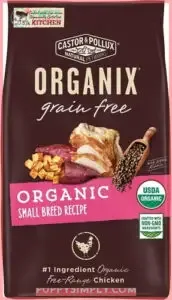
Many organic dog food options claim superiority, but Organix Organic Small Breed Recipe delivers genuine nutritional value for your Dachshund.
This AAFCO certified formula uses carefully selected organic ingredients specifically designed for small breed dogs like Dachshunds.
Organic options offer benefits like improved digestion.
Key recipe benefits include:
- Certified organic protein sources supporting lean muscle development
- Small kibble size perfect for Dachshund mouths and digestion
- Breed-specific nutrient profile addressing common small breed health concerns
- Natural preservation methods maintaining ingredient integrity without artificial additives
6. Whole Earth Farms Grain-Free Chicken Turkey Dog Food
Premium bird food fuels your dachshund’s health with Whole Earth Farms’ grain-free chicken turkey blend.
This dog food delivers dual protein sources through real chicken and turkey, supporting lean muscle development.
Grain-free benefits include easier digestion for sensitive stomachs.
Ingredient analysis reveals wholesome vegetables and fruits.
Cost comparison shows excellent value for premium nutrition.
Dachshund suitability shines through small-breed-friendly kibble size and balanced grainfree food formulation perfect for Dachshunds.
7. Nutro Natural Choice Senior Chicken Rice
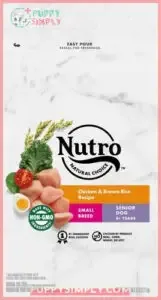
Your senior dog’s golden years deserve Nutro Natural Choice Senior Chicken Rice’s thoughtful Senior Formulation.
This Natural Ingredients blend supports aging Dachshunds with:
- Real Chicken Protein for muscle maintenance
- Gentle rice for Dachshund Digestion support
- Joint health nutrients for mobility
Nutro crafts this senior dog food understanding that older Dachshunds need specialized nutrition for their unique needs, providing a blend that includes Real Chicken Protein and supports joint health.
8. Natures Logic Canine Beef
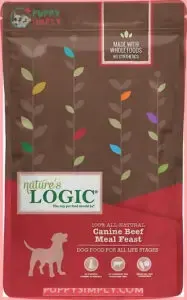
Eighth on our list, Nature’s Logic Canine Beef offers whole food nutrition that’s perfect for dachshunds with spinal issues.
This small breed formula features beef protein as the primary ingredient, sourced from quality farms.
You’ll appreciate the unique nutrients from concentrated superfoods like dried kelp and montmorillonite clay.
The digestibility factors shine through careful processing that preserves natural enzymes, while palatability concerns are rare, some picky eaters might need gradual introductions to this breed-specific dog food.
9. ORIJEN Puppy Dog Food
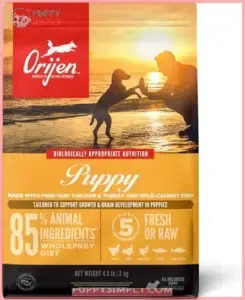
ORIJEN Puppy Dog Food stands out for growing dachshunds needing high protein nutrition.
This premium puppy food delivers exceptional muscle development through fresh meats and grain-free benefits. Perfect for small breed puppies requiring breed-specific nutrition during pivotal growth phases.
- 43% protein content supports rapid puppy growth
- Fresh regional ingredients provide superior digestibility
- Grain-free formula reduces inflammatory responses in sensitive dachshunds
10. Diamond Naturals Puppy Dog Food
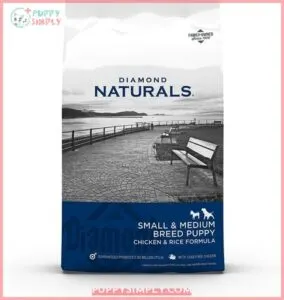
Diamond Naturals offers budget-friendly Affordable Puppy Food that doesn’t compromise on quality for your Dachshunds.
This small breed formula contains Chicken Protein Source and DHA for healthy Puppy Development.
The Antioxidant Benefits from fruits and vegetables support your puppies’ immune systems, while balanced nutrition promotes Puppy Bone Health.
Diamond Naturals puppy food delivers excellent value without breaking the bank.
Feeding Tips and Considerations
Feeding your dachshund properly isn’t just about choosing the right food—it’s about timing, portions, and understanding their unique needs.
You’ll need to master feeding schedules, control portions carefully, and know when supplements can support those vulnerable joints.
Feeding Frequency
Your Dachshund’s feeding schedule depends on their age and specific needs.
Puppies require four meals daily to support rapid growth, while adults thrive on two to three meals.
Senior Dachshunds benefit from smaller, frequent meals that aid digestion. A proper dachshund feeding schedule is key to their health.
Avoid grazing dangers by establishing consistent meal timing—this prevents obesity and helps regulate your dog’s metabolism for ideal health.
Portion Control
Your dachshund’s portion control isn’t guesswork—it’s about precision.
Measuring food accurately prevents obesity, which strains their vulnerable spines. Consider your dog’s activity levels when calculating daily calorie needs, and don’t forget treats count toward their total intake.
- Calorie Counting: Active dachshunds need 900 calories daily, adults 575, seniors 475
- Measuring Food: Use kitchen scales for accuracy—15 lbs = 1 cup dry food
- Treats Included: Limit treats to 10% of total daily calories
- Weight Monitoring: Weekly weigh-ins catch weight gain early for obesity prevention
Switching Foods
Food-change periods require patience and planning.
When switching your Dachshund’s dog food, follow a gradual introduction over seven to ten days to prevent digestive upset and allergic reactions.
Mix increasing ratios of new food with decreasing amounts of current food.
This conversion timeline helps maintain digestive health and addresses palatability concerns.
Monitor for sensitive stomach signs throughout the breed-specific nutrition change, ensuring a smooth transition with digestive health in mind.
Hip and Joint Supplements
Strengthening your dachshund’s spine starts with targeted supplements. These chondrodystrophic breeds face unique joint health challenges, making glucosamine and chondroitin essential allies in fighting intervertebral disc disease.
Consider dachshund joint supplements for added support.
Consider these proven joint health strategies:
- Glucosamine Sources – 250-500mg daily supports cartilage repair
- Chondroitin Benefits – Works with glucosamine for maximum effectiveness
- MSM Effectiveness – Reduces inflammation and promotes healing
- Alternative Therapies – Omega-3s and turmeric provide natural support
Dietary Needs by Life Stage
Growing puppies need higher protein (22.5% minimum) and more frequent meals than adults, while seniors require muscle-supporting nutrition with joint supplements.
Your dachshund’s calorie intake shifts dramatically across life stages—from development-focused puppy nutrition to maintenance adult diets, then specialized senior formulas addressing slower metabolism and mobility needs.
Dachshund puppies may benefit from breed specific formulas to guarantee proper growth.
Frequently Asked Questions (FAQs)
Should Dachshunds have dry or wet food?
Water makes up 65% of your dachshund’s body weight, making hydration essential.
Both dry and wet food work well, but wet food helps meet water needs while dry food supports dental health.
You can mix both for maximum nutrition and hydration benefits.
Is Purina Pro Plan good for Dachshunds?
Yes, Purina Pro Plan works well for dachshunds.
It’s budget-friendly, protein-rich, and includes probiotics for healthy digestion.
The Small Breed Adult formula is specifically mentioned as suitable for dachshunds with sensitive stomachs, making it a good option due to its probiotics.
What are Dachshunds most allergic to?
Dachshunds struggle most with corn, wheat, soy, dairy, chicken, and beef allergies, plus environmental triggers like pollen, dust mites, and mold spores.
Watch for excessive scratching, paw-chewing, and skin irritation as telltale signs of these allergies.
What diet should a Dachshund have?
Your dachshund needs high-quality animal protein (28-43%), moderate fat levels, minimal processed carbs, and life-stage specific nutrition. Feed puppies four times daily, adults twice, avoiding grazing to prevent obesity.
Can dachshunds eat homemade dog food safely?
Homemade meals can work if you’re balancing proteins, fats, and vitamins correctly.
You’ll need recipes from veterinary nutritionists since dachshunds require specific nutrient ratios for their spine health and energy needs.
What treats are best for dachshunds?
Small, soft treats work best for dachshunds’ delicate mouths and weight management needs.
Choose low-calorie options like freeze-dried meats, small training treats, or broken pieces of their regular kibble to prevent overfeeding and maintain their healthy weight.
Are grain-free diets necessary for dachshunds?
Grain-free diets aren’t necessary for most dachshunds.
While some brands offer excellent grain-free options, many high-quality foods include grains like oatmeal and rice that provide beneficial nutrients and fiber for your wiener dog’s digestive health.
How to transition between different food brands?
Studies show 90% of digestive upsets occur when you switch foods too quickly. Gradually switch over 7-10 days by mixing increasing amounts of new food with decreasing old food portions daily.
Do dachshunds need special feeding bowls?
Yes, dachshunds benefit from elevated or raised feeding bowls that reduce strain on their elongated spine and neck.
Choose shallow, wide bowls to prevent whisker stress and make eating easier for their unique body structure.
Conclusion
Choosing the best dog food for dachshunds is absolutely life-changing for your wiener dog’s health and happiness.
Your doxie’s unique body needs specialized nutrition to prevent back problems and maintain a healthy weight.
The right food contains quality protein, controlled calories, and joint-supporting ingredients like glucosamine.
Remember to feed smaller portions frequently and choose kibble sized for their mouths.
With proper nutrition, you’ll help your dachshund avoid costly health issues while keeping them active and comfortable for years ahead.
- https://www.thehonestkitchen.com/blogs/pet-food-ingredients/best-dog-food-for-dachshunds
- https://www.prodograw.com/raw-feeding-guide/dachshund-feeding-guide/
- https://www.petabolix.com/dog-breed-nutrition/dog-food-for-dachshunds
- https://www.purina.co.uk/articles/dogs/health/symptoms/dachshund-health-problems
- https://youdidwhatwithyourweiner.com/common-dachshund-health-issues/

